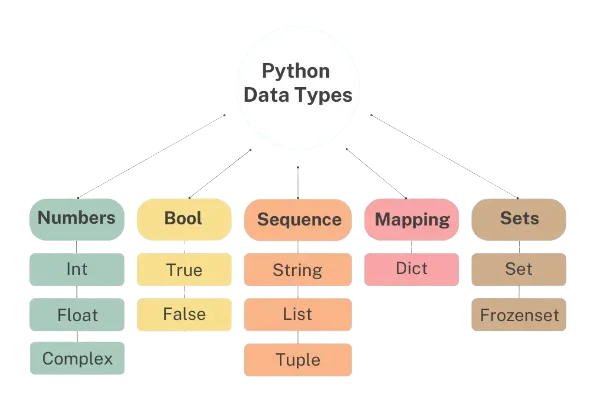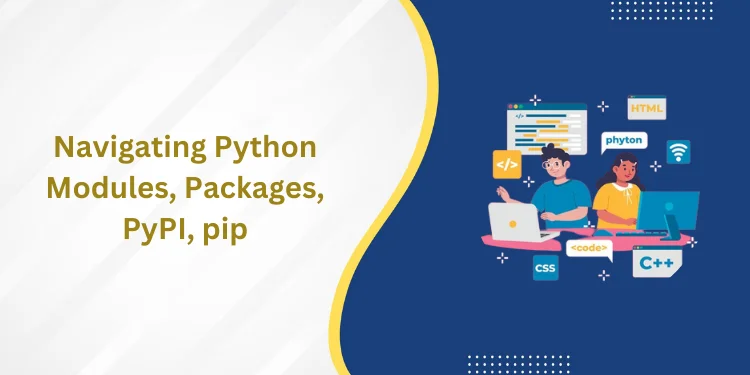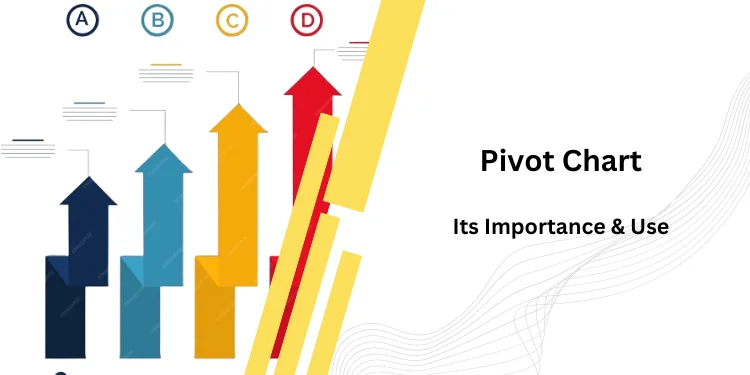Introduction to Deloitte Business Analyst
“Whether your business sells Reiki healings or Jeans, Custom Pottery or YouTube Meditations, Computer Software or Construction materials…. Business fundamentals remain business fundamentals… Create value, communicate value, sell value.”
― Hendrith Vanlon Smith Jr, The Wealth Reference Guide: An American Classic
A Deloitte Business Analyst (also known as a management analyst) is responsible for analyzing a company’s ever-changing demands and delivering technology solutions to enhance its processes and systems. As a result, a business analyst is often seen as the interface between the business and IT divisions.
With the introduction of computers in the 1970s and 1980s, businesses started to transition paper-based procedures into automated, electronic processes. In the 1980s and 1990s, business analysts were on the scene to combine this new technology with commercial acumen.
However, technology is transforming this function. Because of recent breakthroughs in big data, the position of the business analyst has altered significantly. Business analysts (along with other data science positions) may now mine big data to better understand consumer behavior and discover system inefficiencies, for example.
Within a company, business analysts assess present systems and create strategic strategies. This requires in-depth understanding of both the individual firm as well as industry trends and practices. Communication strategies between internal departments and external stakeholders is an important feature of the business analyst’s function.
According to the International Institute of Business Analysts (IIBA), business analysts are change agents, and one of the key roles of the business analyst is to initiate change in an organization. These changes might be high-level, such as large-scale structural or policy changes, or they can be more specific, such as identifying cost-cutting options. In any case, the modifications implemented by a business analyst should assist a company in identifying and realizing new possibilities.
Business analysts will also create or upgrade computer systems to meet their clients’ demands. The business analyst gives requirements to the IT department for the development of this new technical system, as well as assistance with testing and implementation.
About Deloitte

Deloitte is a worldwide leader in audit and assurance, consulting, financial and risk advising, tax, and other associated services. With more than 150 years of hard labor and dedication to make a genuine impact, our organization has expanded in size and diversity—approximately 286,000 individuals delivering these services in 150 countries and territories—yet their common culture has not changed. 4 out of every 5 Fortune Global 500® corporations are served by their group.
According to statistics from 2012, Deloitte had the most customers among the FTSE 250 firms in the UK, and Deloitte now has the biggest market share in auditing among the top 500 corporations in India.
Gartner puts Deloitte first in consulting by market share, while Kennedy Consulting Research and Advisory ranks Deloitte first in global consulting and management consulting by aggregate revenue for the fourth straight year. Deloitte was ranked seventh on Forbes’ Global 2000 list in 2016 and seventeenth in 2015.
Deloitte employed 345,000 members of staff globally in 2021.
Deloitte Business Analyst – The Interview Process

Also Read: Amazon Data Scientist
A career at Deloitte requires accuracy, professionalism, and exceptional expertise. Knowing what to anticipate and carefully preparing for your job interview can guarantee that you come off as a knowledgeable, composed, and competent applicant, as well as help you have a more successful interview experience with one of the world’s biggest privately-owned corporations.
Here’s a general outline of things to anticipate during your Deloitte Business Analyst job interview:
Fill out an application. Submitting a polished job application is perhaps the most significant aspect of the recruiting process. Sending in a detailed, edited, and well constructed job application is the quickest way to gain an interview and, eventually, a position with Deloitte.
Although job applications may be completed online, many Deloitte workers first applied for their position via college career fairs or through employee recommendations.
A personal connection within the organization, whether with a professional in your network or a recruiting manager you met, can greatly increase your chances of getting called in for an interview.
The first interview for Deloitte Business Analyst. If recruiting managers at Deloitte are pleased with your application, you will be called for an interview. You may usually expect to hear back from them within one to three months by email or phone.
The initial round of interviews may be held in person, over the phone, or over Skype or video conference, depending on the position you’re looking for and the location of the employment.
The initial interview for the position Deloitte Business Analyst, regardless of the role, is usually conducted by a human resources representative and comprises of basic interview questions, including critical thinking and resume-based questions.
Deloitte’s first round of interviews may also include a brief JAM, or Just A Minute, round in which a job candidate is assigned subjects to talk on for one minute.
Interview number two for Deloitte Business Analyst. If you nailed your first Deloitte Business Analyst Interview, your job is far from done. The majority of new Deloitte employees must go through two to three rounds of interviews.
If your first interview occurred in person, the second interview might be undertaken soon after the first. Deloitte is notorious for conducting rigorous job interviews, sometimes asking applicants to report to one of its more than 700 worldwide sites for a full day of interviewing.
The second job interview with Deloitte is typically 30 minutes long and includes behavioral and situational interview questions.
The interview is normally performed by a senior management and contains a slew of situational interview questions, particularly if you’re seeking for a highly specialised or technical position, such as engineer or programmer.
The third interview for Deloitte Business Analyst. Finally, if you’re seeking for an advanced or highly technical function inside the firm, you’ll most likely be expected to go through one more round of questioning with a senior manager, partner, department director, or possibly a panel of interviewers after the second interview.
The third interview, which is your road to employment, is reserved for just the most qualified individuals. It’s extremely important to put your best foot forward at the third interview, since every word will be scrutinized and evaluated.
The third interview, like the second, usually comprises of more situational and job-specific interview questions.
Aptitude assessment b
efore hiring for Deloitte Business Analyst. You’ve made it through Deloitte’s arduous interview process, but you’re not out of the woods yet.
You may be requested to do an aptitude test to further analyze your skills to execute the work, depending on the exact function you’re applying for, as well as your skill level and professional experience.
The Deloitte pre-employment aptitude exam will most likely contain a portion on mathematical, logical, and verbal reasoning to assess your talents.
Some positions, such as audit associate or computer programmer, may need candidates to do a mock audit, answer extra math questions, or build a java algorithm.
Training and orientation. The only thing left in the onboarding process once you’ve been granted a formal job offer is orientation and training. Typically, you’ll be required to fill out paperwork, agree to a background check and fingerprints, and undergo an employee drug test at this step.
All Deloitte employees, regardless of rank, are expected to attend new employee orientation, which includes a thorough overview of corporate rules and procedures.
After orientation, you’ll start your new job, normally with a training or probationary period for the first several months. Depending on your function and degree of experience, you may be needed to go through substantial one-on-one training or absolutely none at all.
Deloitte Business Analyst- Interview Questions

Also Read: Data Analyst at Amazon
Now that you’re aware what Deloitte Business Analyst interview process looks like, let’s go through a heap of questions that you can expect at these different stages of interviews for your Business Analyst position.
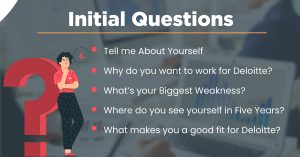
It is critical that you include concrete instances from your job or school to illustrate your talents and beliefs, as well as explain why you are interested in working with Deloitte.
When addressing generic interview questions, it’s a good idea to keep Deloitte’s values in mind. They are as follows:
- Integrity entails maintaining one’s reputation and doing business properly.
- Outstanding value to the market and clients – a promise made by Deloitte workers.
- Commitment to one another — a collaborative and cooperative mentality.
- Cultural variety provides strength.
- The general questions, like with every interview, are a method for the interviewer to learn more about you and determine if you are a good match for the firm.
If you can show that your values are comparable to those of Deloitte, this will be a plus. Don’t push your response – it’s crucial to be true to yourself – but keep them in mind.
Deloitte Business Analyst- Situational and Behavioral Questions

- Walk me through our Resume.
- What accomplishments are you most proud of?
- Tell me about something that is not on your resume.
- Tell me about a time when you had to lead a team.
- Give an example of a time when you successfully persuaded someone.
- How do you make tough decisions knowing they will affect your entire team?
- Our industry is a competitive one. Why do you specifically want to work as a Deloitte Business Analyst?
- When have you had to change a major component of your project due to new information being presented?
- How would you respond to a request for doing a task you’ve never done before?
Here are a few pointers to help you prepare for any behavioral interview questions:
- Prepare some tales. For a serious interview, you should have a few relevant anecdotes from your professional background on hand. This way, you’ll be able to tailor your response to emphasize your good qualities and actions. You won’t have to come up with a tale on the go, which may be stressful.
- Examine the job description for desirable abilities. Examining the job description for the position you’re looking for might provide a wealth of information about the abilities a great applicant should possess. If the job you’re looking for requires you to operate under tight constraints, you might want to narrate a tale that highlights your time management abilities. If a position requires leadership, write a tale about a time when you effectively led a project or mentored someone.
- Use the STAR technique. The S.T.A.R. approach can help you frame and convey your tales. STAR stands for the circumstance (the difficult position you found yourself in), task (what the situation required of you), action (the action or reaction you took in the situation), and results (the outcome). By structuring your story in this manner, you may cover all of your talking points without leaving anything out.
- Accept responsibility for previous faults. Interviewers frequently inquire about occasions when you have been pushed, made errors, or had to overcome your flaws. Be truthful, and use these questions to demonstrate how much you’ve learned from your own errors.
- Take your time. Allow yourself plenty of time to adequately explain each of your experiences. It’s easy to hurry through a tale, but try to resist doing so. Make sure you fully define every aspect of the circumstance you’re describing.
- Maintain your cheerful attitude. Consider the positive parts of your experiences. When describing a difficult circumstance, try not to dwell on your aggravation. Move quickly on to the actions you did to reduce the error, stressing your problem-solving talents.
Deloitte Business Analyst- Logical Reasoning Questions

- In a class of 45 students, Aravind’s rank from the top is 16th. Basha is 6 ranks below Aravind. What is Basha’s rank from the bottom?
- In a row of children, Darshini is 7th from the left and Vikas is 9th from the right. When they interchange their places among themselves, Darshini becomes 18th From the left. Then what will be Vikas’s present position from the right?
- A number of students are standing in a row facing north in such a way that a particular student is nineteenth from both the ends. To find the number of students in the class.
- The government launched two incentive schemes “Lucky Grahak Yojana and Digi-Dhan Vyapar Yojana for both consumers and merchants. Which of the following will impact these t
wo schemes?
Also Read: Data Analyst at Accenture
Although no prior knowledge is necessary for logical reasoning examinations, taking the time to study well might boost your chances of scoring well on the test and so progressing to the next level of the recruiting process.
Here are our top logical reasoning exam preparation tips:
Step 1: Understand what you’re taking. Because logical reasoning exams can take many various forms and varies in structure and format depending on the test publisher, it is critical that you understand what test you are taking before you begin preparing.
If these facts are not available, contact the recruiter or hiring manager to learn more about the exam you will be taking.
It is critical to learn vital information regarding the exam, such as whether it is negatively graded or not, the time restriction, the question type, and the number of questions. Knowing this will allow you to efficiently prepare in order to offer yourself the best chance of success.
Step 2: Run realistic sample tests. It should come as no surprise that practicing sample questions is the most vital strategy for preparing for your logical reasoning test.
Practicing will help you become acquainted with the format and type of questions on the test, allowing you to refine your abilities, boost your confidence, and calm your anxieties before the exam.
Logical thinking problems can be presented in a variety of ways, so taking as many exams as possible will guarantee you are prepared for any question that comes your way.
Step 3: Double-check your answers. Not only can practicing sample tests help you improve your score, but so does learning from mistakes.
After you finish an exam, go through your answers alongside the solutions and explanations to see where you went wrong and which question types you struggled with the most.
You may then prioritize these weaker areas when practicing, ensuring that you are strong across the board when the real test comes.
4th step: Think laterally. It is not necessary to confine practice for the test to answering sample questions. Completing puzzles such as sudoku or crosswords may keep your preparation interesting.
This will boost your ability to tackle issues on the logical reasoning test by honing your logical thinking and problem-solving abilities.
Step 5: Plan a plan for answering the questions. It’s highly likely that you will discover your most efficient strategies as you practice. You may, for example, have a specific method for identifying relationships, or you may begin a question by analyzing how the forms change in the sequence, and then guess what the next form will look like before looking at the responses.
You will be able to move through the questions more effectively after you have determined what works best for you.
Also Read: Google Data Analyst
Deloitte Business Analyst – Skills, Requirements, and Salary
Skills for a Deloitte Business Analyst
- Understanding the Business Objective
- Analytical and Critical Thinking
- Communication and Interpersonal Skills
- Negotiation and Cost-Benefit Analysis
- Decision-Making Skills
- Programming Languages
- Creation of Reports and Dashboards
- Database and SQL
- Microsoft Excel
- Documentation and Presentation
Requirements as a Deloitte Business Analyst
- A bachelor’s degree in business or a related field, or a master’s degree in business administration.
- Experience in business analysis or a related field of at least 5 years is required.
- Analytical and conceptual thinking abilities that are second to none.
- The ability to persuade stakeholders and collaborate with them to find solutions that are acceptable.
- Technical expertise required.
- Documentation skills are exceptional.
- Analytical and conceptual reasoning skills are essential.
- Detailed report writing and presentation skills are required.
- Word, Excel, and Outlook are examples of Microsoft applications.
- A history of keeping promises.
- Excellent time management, planning, and organizational abilities.
- Responsibilities
- Analyze potential gaps and provide advice to clients on how to improve operational procedures and infrastructure.
- Create process maps and standard operating procedures (SOPs) to describe the operations of your clients.
- Read legal documents and convert them to operational needs.
- Conduct research to improve clients’ operations by providing insight, consistency, and value.
- Financial modeling, analytics, technology, operations, and asset management are some of the services that we offer.
- Request information and resolve any issues by effectively communicating with internal and external parties.
- Assist with the installation of new client application instances, as well as the documentation, configuration, and testing of our systems’ integration with the systems of our clients.
- User manuals, release notes, documentation, training materials, and FAQs should all be created and kept up to date.
- Take part in the User Acceptance process. The development of scenario-based test cases is part of the testing of system enhancements and new applications.
- Preferred
- GIT or another source control system may be used.
- Agile development methodologies have been introduced to you.
- It would be advantageous if you had experience with public cloud applications (such as Azure, AWS, or Google Cloud).
- It would be advantageous if you had experience with NoSQL databases (e.g., MongoDB or Cosmos DB).
- Experience with reporting tools such as PowerBI, Tableau, and others would be beneficial.
For a better image, you can check out a few job postings by Deloitte here:
- Deloitte B
usiness Analyst – Consultant Role - Deloitte Consulting – Deloitte Business Analyst (Business Technology Solutions)
- Business Process Analyst
- Functional Analyst/Deloitte Business Analyst with Secret Clearance
- Lead Talent Deloitte Business Analyst
Deloitte Business Analyst Salary
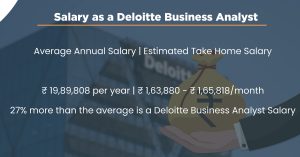
For people with less than one year of experience to six years of experience, the average Deloitte Business Analyst compensation in India is 19.9 Lakhs per year. Deloitte Business Analyst salary varies from 16.0 to 49.7 lakhs per year. Salary estimates are based on 980 salaries collected from Deloitte employees.
Deloitte Business Analyst – Some Final Tips
- Examine the Deloitte business analyst job profile for which you have applied or for which you have an interview scheduled. Understand the position fully, including what they want from you, the skill sets, and the certifications you’ll require. Check that you have all of the relevant information. This will save you from getting caught off guard on the day of the interview.
- The first step toward a good interview of Deloitte business analyst is “self-confidence.” If you’re confident, you’ve already performed half of the work. Always have a positive attitude and a grin on your face.
- The more you prepare for the interview for Deloitte business analyst, the more likely you are to succeed. Find out everything you can about interview stages, rounds, and questions, among other things. Answers to frequently asked HR and management interview questions should be prepared in advance. Maintain vigilance over your technical subjects and final year project. You could also learn about the company’s achievements, organizational structure, vision, work-life balance, and other concerns.
- Examine your resume carefully to ensure that you’ve included all relevant information about yourself and that the information you’ve provided is accurate to the best of your ability. If you have taken a sabbatical from school or work, ensure that you are prepared to respond positively.
Frequently Asked Questions
Does Deloitte have a business analyst position?
Yes, Deloitte offers a position called Deloitte Business Analyst and these are the people who comprehend the client’s business case and translate it into technical specifications for the technical team to construct a product or satisfy a service demand.
What does a Deloitte business analyst do at Deloitte?
The Deloitte business analyst conducts research for allocated engagements/projects and deliver significant analysis/output for evaluation. Gather information through networking and research to understand Deloitte’s larger products and to be aware of cross-selling opportunities.
How much does a Deloitte Business Analyst earn?
The average Deloitte Business Analyst compensation in India is 19.9 Lakhs per year. Deloitte Business Analyst varies from 16.0 to 49.7 lakhs per year.
Is Deloitte Business Analyst a good job?
Overall, the firm is favorable to new employees. A Deloitte business analyst works with a lot of pros. In comparison to other firms, the Deloitte business analyst salary is fairly good.
Does Deloitte cover the cost of an MBA?
Deloitte’s Graduate School Assistance Program provides funding for the MBA (GSAP). Deloitte workers often work for the firm for 3 to 4 years before going on to graduate school and returning to the organization as Senior Consultants.
Is there a sign-on bonus at Deloitte?
The joining incentive will be deducted from your first month’s income. It is stated on the offer letter that when you receive it. So, in general, a Deloitte business analyst will receive the joining bonus on your first salary whenever it occurs.





